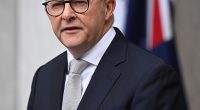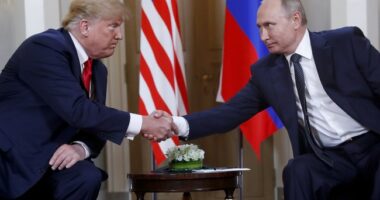Considering “Liberation Day” is the key foreign policy measure from a president with a habit of speaking his mind, surprisingly little is known about what it will bring for the US and the rest of the world.
The announcement is set down for a 4pm (7am tomorrow AEDT) event from the Rose Garden in the White House dubbed “Make America Wealthy Again” but the policies themselves are a mystery.

Billions of dollars in Australian exports from beef and sheep to pharmaceuticals and the media may be on the receiving end of American punishment, if an updated list of US trade grievances is anything to go by.
But there is increasing speculation Trump may ditch his so-called “reciprocal tariffs” – matching dollar for dollar any fees charged by foreign countries on what they import from the US – in favour of blanket imposts.
George Washington University Assistant Professor of Economics Steven Hamilton said he expected the Trump administration to go down that much less complicated and more economically devastating route.
“I’m not actually that worried about the direct effect of the tariffs on Australia. It’s quite small,” he said.

“The thing that we worry about is … the broader fallout across the world, which, you know, if a lot of countries do retaliate there’ll just be a chilling of global trade right?
“And that’s very bad for Australia. When we’re a country, a small country that imports a lot of things.”
In the shorter term, it “wouldn’t be insane” to suggest a significant trade shock would trigger a US recession, in turn triggering a global recession.

That figure is dwarfed by the $212.7 billion sent to China, leading Hamilton to suggest the flow-on effects on global trade and any shrinking of the Chinese economy would hit Australia much harder than the initial charges.
Tariffs are taxes charged on businesses importing goods, not on countries themselves, and the price increases are usually passed on to the consumer. Economists say they can be used to increase tax revenue or protect local industries – but not both at the same time – and generally lead to worse economic conditions.
That’s why Hamilton expects the tariffs will drive up prices for US consumers on all imported goods – and local goods too thanks to increased demand – while shrinking US wages.
The potential upheaval comes at a critical time for Australia as Prime Minister Anthony Albanese and Opposition Leader Peter Dutton criss-cross the country to convince voters their the safest pair of hands to guide the country through the uncertainty.

They threw it all behind Trump – and lost more than $300 billion
While tariffs and Trump more generally have loomed large over the campaign so far, and Labor, has sought to tie Dutton to Trump, both leaders have taken a relatively softly-softly approach.
Australia doesn’t impose any tariffs on US imports but the report took issue with Australian restrictions on US beef, pork, chicken, apples and pears designed to keep out disease and a proposal to impose Australian content quotas on streaming services, among others.
Hamilton warned responding in kind with retaliatory measures would only harm Australia.

“It doesn’t matter what we do. It doesn’t matter what we say. It doesn’t matter what we offer,” he said.
“I think the end goal is to make America kind of fully self-sufficient.
“And there’s only one way to do that, yeah, and, and the cost of that is that Americans will be poorer, and there’s no real, you know, alternative.”
Trump and his advisers have contradicted themselves over the past days and weeks as they have tried to set expectations about what would be announced.
Everything from reciprocal tariffs on all countries, the enactment of delayed 25 per cent tariffs on Mexico and Canada, and tariffs on lumber, copper, pharmaceuticals and microchips have been proposed. Trump has already announced auto tariffs that are set to go into effect on April 3.

“Wednesday, it will be Liberation Day in America, as President Trump has so proudly dubbed it,” White House press secretary Karoline Leavitt said.
“The president will be announcing a tariff plan that will roll back the unfair trade practices that have been ripping off our country for decades. He’s doing this in the best interest of the American worker.”
But Leavitt did not provide any details about what Trump would announce.







